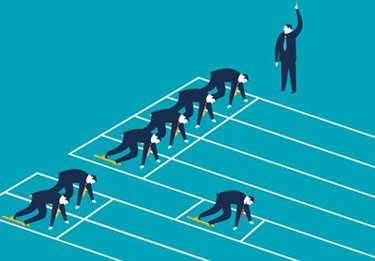Established companies regularly try to misuse government regulations — intended to protect consumers — to stop new and innovative competitors.
By Jeffrey Cole
Almost no one would argue that some governmental regulation is not only necessary, but in many instances desirable. Even the most rigid limited-government conservative would not buy a car that did not meet governmental standards or fly on an airline that is not regulated.
 We can argue about how much regulation is too much and what is the proper balance between no regulation and excessive interference. The last two presidential administrations have used executive orders to go from a yin of strong regulation to the current yang of eliminating as much regulation as possible. Our government is not working when we cannot establish standards through legislation and stick to them rather than going back and forth with executive orders that reflect the politics of the current occupant of the White House.
We can argue about how much regulation is too much and what is the proper balance between no regulation and excessive interference. The last two presidential administrations have used executive orders to go from a yin of strong regulation to the current yang of eliminating as much regulation as possible. Our government is not working when we cannot establish standards through legislation and stick to them rather than going back and forth with executive orders that reflect the politics of the current occupant of the White House.
What concerns me is not too little or too much regulation, but, rather, when regulation is used to stifle competition and innovation. These kinds of regulations are usually encouraged by established businesses trying to protect their industries and keep more innovative newcomers out.
Frequently, established businesses or industries don’t want a new competitor forcing them to change their ways. In many cases these incumbents have been in their communities for generations and maintain strong political relationships, often through donations. They use these ties to call for regulations that keep the innovator away.
Three examples:
Uber and ride-sharing: There is practically no community that Uber entered or tried to enter where strong forces did not try to make it illegal. The taxi industry was greatly threatened by Uber: customers could use an app to call for a ride that showed up quickly and charged much less than a taxi. Perhaps more important, the Uber driver felt like a friend or colleague who welcomed them into their car (offering water and other comforts) and created a pleasant riding experience (partially because both the driver and rider were being rated in a way that affected their future together).
Uber innovated on most of the things people did not like about taxis and did so cheaper with no need for cash and (at least originally) with no tips. The taxi industry went to government and got Uber banned in many communities. They had to find reasons that Uber should not be allowed to compete, but the real reason is that it was better, faster, and cheaper — exactly what competition should offer.
In all fairness, in many cities taxi drivers pay huge fees (in NY at the peak over $1 million) for permission to operate a cab. But rather than trying to get those fees reduced and compete in the areas that Uber excelled, they wanted to make Uber illegal. Even in communities that allowed Uber, it frequently could not offer service to and especially from airports, the heart of most cities’ taxi businesses.
The problem for the taxis is that many more people love Uber (and Lyft and others) than fear it. Uber needs to be regulated (particularly in the executive suite!), but it should not be regulated out of existence because it can do what taxis do in a way that works much better for the customer.
Tesla and auto dealers: Tesla is the first new automobile company in America in a generation. It has caught the imagination of high-end car buyers (and with the Model 3 perhaps all car buyers) with an innovative image as a long-range electric car, constantly connected to the internet with a computer sized screen and much additional technology. It also has shaken the traditional car-selling model by selling directly to its customers without the need for dealerships. It does have showrooms in many high-end malls and other locations where prospective buyers can drive the car and ask questions. But, they configure and buy their Teslas online or by using a computer in the showroom.
This is a direct threat to automobile dealers. Rather than trying to understand the appeal of Tesla and working with their manufactures to innovate, they want to make it illegal for Tesla to sell directly to consumers. They have succeeded in several states.
Dealers have to contort themselves to find a justification for why Tesla should not be able to sell directly. They talk about service and reliability, but Tesla has service centers and is rated much higher than traditional automobile companies in customer satisfaction. Dealers are a prime example of businesses that have been in their community for generations with strong ties to elected officials. They use their clout to ban direct selling to consumers, not because it is wrong but because they want to protect their businesses. This is understandable, but think if every company could eliminate competition simply by making innovation in their space illegal.
Funerals and caskets: When a loved one has died and families need the services of a funeral home, they are not in a state of mind to do comparison-shopping or even to know what things should cost. This is particularly true if the loss is unexpected. The highest price item in a funeral is a casket, and few consumers know much about them or how much they cost.
Costco sells caskets online. No one wants a casket delivered to their home in seven days. Instead, Costco delivers the casket overnight to the funeral home you identity. Costco is one of the few stores that customers know they have the best or close to best prices. People can buy from Costco without comparison-shopping knowing the price will be very good or excellent.
The funeral industry does not want people buying its highest-profit item from a discount warehouse and cutting them out of the purchase. Like automobile dealers, they have also been in the community for a long time and maintain a close relationship with elected officials.
The funeral business has had to try to create a reason why this form of competition should be made illegal. They too contort themselves and mention things like sanitation. It is almost impossible to see where sanitation plays any role.
Simply put, they don’t want anyone interfering in a business they completely control and offering new alternatives at lower prices. They have gone to regulators to make this kind of competition illegal.
____________________
We can argue about how much regulation is too much and what is the proper balance between no regulation and excessive interference. What concerns me is not too little or too much regulation, but, rather, when regulation is used to stifle competition and innovation.
____________________
It is painful to build a business with a solid base of customers (taxis, auto dealers and funeral homes) and then to see new players move in, frequently using new technology, to offer better services at a lower price. These are businesses that have been around a long time and have never faced much competition except from other taxi companies, auto dealers or funeral homes.
Our economy is based on encouraging innovation and competition. Only a few benefit and most suffer when the competition is simply made illegal.
Taxi companies, auto dealers and funeral homes (as three examples) may have to innovative their businesses, live with smaller margins and accept competition.
Regulation is a tool for protecting our safety, not old industry’s pocket books. The sooner the established businesses accept this, the sooner they can compete effectively.
____________

Jeffrey Cole is the director of The Center for the Digital Future at USC Annenberg.
See all columns from the Center.
December 7, 2017

